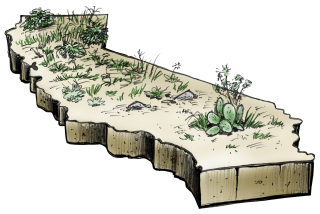Water conservation improved in September but is still worse than in 2015
Californians halted a three-month slide in water conservation in September, saving enough to hearten state regulators who previously had expressed alarm about possible drought fatigue.
Residents and businesses cut their water consumption by 18.3% in September compared with the same month in 2013. The savings represented a slight uptick from the 17.5% reduction urban Californians managed in August.
“I am glad to see the slide stop, and even reverse a bit overall, especially as we move into traditionally lower water-use months when we would expect [savings] percentages to drop significantly,” State Water Resources Control Board Chairwoman Felicia Marcus said in a statement.
“Overall, we’re happy to see millions of Californians and many water agencies continue significant conservation,” she added. “Conversely, we’re concerned to see some agencies return to using hundreds of gallons per person per day while saving little. … We need to keep conserving.”
Conservation backsliding has been a point of concern among officials in recent months.
A statewide analysis by The Times found that water conservation slid about 9 percentage points in June, July and August of this year compared with the same period in 2015, at the height of the drought.
About 93% of local suppliers saved less this summer than they did during the summer of 2015, according to the analysis.
In its statement Tuesday, the board praised many water suppliers for maintaining high levels of conservation — including some that saved more this September than in September 2015.
However, regulators also singled out a few suppliers that they said were not “sustaining significant conservation.” They listed the San Juan Water District, the supplier The Times focused on in its report, as one they were “particularly concerned about.”
At their Tuesday meeting, regulators and representatives of water agencies said it was important to look at cumulative savings numbers rather than concentrating solely on monthly savings percentages.
During the 16-month period that ended in September, Californians used 23% less water compared with 2013 benchmarks, water board staff members said.
Some agency representatives took umbrage at the notion that they are abandoning conservation.
“It’s a good news story,” said Dave Bolland of the Assn. of California Water Agencies.
He added that some media organizations are attempting to “make a story about all of California out of a few specific agency situations.”
Inland Northern California was home to some of the state’s biggest backsliders during June, July and August, according to The Times’ analysis.
On Tuesday, Amy Talbot, a representative of the Regional Water Authority for the greater Sacramento area, framed the upticks in usage as a natural consequence of moving from mandatory conservation to voluntary conservation. “We see it not as backsliding, as some articles have mentioned,” she said.
Environmental advocates, however, saw September’s 18.3% savings as a significant slip from the 26.2% savings achieved in September 2015 under mandatory conservation.
The board lifted mandatory conservation for the vast majority of California suppliers earlier this year.
“The state board has failed the people of California by letting water agencies off the hook for mandatory conservation,” said Tracy Quinn, senior water policy analyst at the Natural Resources Defense Council. “That sent a very confusing message to residents, who are wrongly being told it’s OK to water their lawns or roll back the conservation efforts they’d implemented over the past few years.”
In her statement, Quinn called for a return to mandatory conservation targets and “a suite of strong permanent conservation measures.”
The executive order that governs the current drought rules will expire in February. So water board members will need to decide whether the emergency regulations should be extended; if so, officials may choose to modify them further.
A series of storms in Northern California has gotten the state off to a good start, officials said. As of Tuesday, an eight-station index that measures rain in the northern Sierra Nevada had recorded 12.6 inches of precipitation — almost 400% of the average for Nov. 1.
Regulators wondered aloud how the rain would affect conservation during October. More rain, they said, should lead to less outdoor watering — and perhaps greater savings.
“We’re watching the weather like everyone else is,” said Max Gomberg, the water board’s climate and conservation manager. “This is an encouraging start to the water year, but there’s a long way to go.”
Twitter: @ByMattStevens
ALSO
Santa Ana winds are expected to bring warmer temperatures this week
Child stabbed to death at factory where mom works; police take suspect into custody
UPDATES:
2:45 p.m.: This article was updated with additional comment and information about recent rains in Northern California.
This article was originally published at 11:35 a.m.
More to Read
Sign up for Essential California
The most important California stories and recommendations in your inbox every morning.
You may occasionally receive promotional content from the Los Angeles Times.











